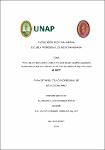Test no estresante como predictor de complicaciones neonatales en gestantes con pre-eclampsia, Iquitos 2019 al 2020
Abstract
Objective: To determine if the non-stress test predicts neonatal complications (low Apgar score, prematurity, low birth weight, neonatal sepsis, need for admission to the neonatal intensive care unit NICU, prolonged hospital stay, and meconium amniotic fluid), of pregnant women with Pre-eclampsia at the Regional Hospital of Loreto, 2019 to 2020. Methodology: This research was observational, analytical, with a cross-sectional design, where we worked with a sample of 80 pregnant women diagnosed with Preeclampsia who underwent a Non-stress test until the last 15 days before the arrest. The study variables were adverse perinatal outcomes (low Apgar, neonatal sepsis, prematurity, low birth weight, NICU admission, prolonged hospital stay, perinatal death, need for mechanical ventilation and presence of meconium amniotic fluid. For bivariate analysis and calculation of strength of association or inferential analysis was performed through the calculation of Chi square, Fisher's exact test, with a confidence level of 95% (p < 0.05) and the prevalence ratio with its respective confidence interval. The diagnostic values or predictive capacity and the safety of the diagnostic test will be calculated using the values of sensitivity, specificity, positive predictive value and negative predictive value. Results: Of a total of 80 pregnant women with preeclampsia, 12% of the NST studies were non-reactive; The non-stress test was associated with the presence of low Apgar scores, neonatal sepsis, prolonged hospital stay, prematurity, and admission to the NICU. In addition, the non-stress test has a high specificity and positive predictive value, so if a pregnant woman presents a NST Reactive test, she has a high probability that the newborn will not present any adverse perinatal outcome. Conclusions: the non-stress test is a good predictor of adverse perinatal outcomes, especially due to its high rate of specificity and negative predictive value. Objetivo: Determinar si el test no estresante predice las complicaciones neonatales (Apgar bajo, prematuridad, bajo peso al nacer, sepsis neonatal, necesidad de ingreso a unidad de cuidados intensivos neonatales UCIN, estancia hospitalaria prolongada, y líquido amniótico meconial), de gestantes con Pre-eclampsia en el Hospital Regional de Loreto, 2019 al 2020. Metodología: Esta investigación fue de tipo observacional, analítico, de diseño transversal, donde se trabajó con una muestra de 80 gestantes con diagnóstico de Pre-eclampsia a las cuales se les practicó un test No estresante hasta los últimos 15 días antes del parto. Las variables en estudio fueron los resultados perinatales adversos (Apgar bajo, Sepsis neonatal, Prematuridad, bajo peso al nacer, ingreso a UCIN, estancia hospitalaria prolongada, muerte perinatal, necesidad de ventilación mecánica y presencia de Líquido amniótico meconial. Para el análisis bivariado y cálculo de fuerza de asociación o Análisis inferencial se realizó a través del cálculo de Chi cuadrado, test exacto de Fisher, con un nivel de confianza del 95% (p < 0.05) y la razón de prevalencia con su respectivo intervalo de confianza. Además, se calcularon los valores diagnósticos o capacidad predictiva y la seguridad de la prueba diagnóstica mediante los valores de sensibilidad, especificidad, valor predictivo positivo y valor predictivo negativo. Resultados: de un total de 80 gestantes con Pre-eclampsia el 12% de los estudios de NST fueron no reactivos; El test no estresante se asoció a la presencia de Apgar bajo, sepsis neonatal, estancia hospitalaria prolongada, prematuridad e ingreso a UCIN. Además, el test no estresante tiene una alta especificidad y valor predictivo positivo, por lo que, si una gestante presenta un test Reactivo al NST, tiene una alta probabilidad de que el recién nacido no presente ningún resultado perinatal adverso. Conclusiones: El test no estresante es un buen predictor de resultados perinatales adversos sobre todo por su alta tasa de especificidad y valor predictivo negativo.
Collections
- Tesis [367]


